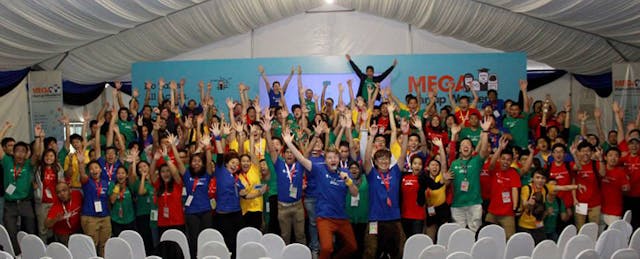For many people, listening to “ Do You Believe in Magic” on repeat for several hours could be quite unbearable.
But in Malaysia, the audience cheered and reveled as the song accompanied the official launch of the Malaysia Global Innovation and Creativity Center (MaGIC) on April 27.
MaGIC will be a one-stop center for entrepreneurs--everything from incubators, access to venture funds, legal help and support for product development. Seattle-based UP Global’s new Southeast Asia offices will be housed in this center, along with a satellite of Stanford University’s Center for Professional Development. Adam Stelle, VP at UP Global, recognizes that "Malaysia is quickly emerging as a hub of startup activity throughout Southeast Asia, with incredible support for new entrepreneurs coming from both public and private sectors."
The Malaysian government sees entrepreneurship as one path towards bringing more prosperity to its people. 1MeT, an initiative from the Ministry of Finance, for example, has catalogued over 10,000 local entrepreneurs in a database since it began tracking in 2013. 1MET hopes to support an ambitious 5,000 young entrepreneurs yearly, some of whom will be involved in edtech.
The event also marked the beginning of Mega Startup Weekend, a four-day event that brought together over 300 entrepreneurs from Malaysia, Singapore and surrounding countries. They competed across three strands: gaming, e-commerce and education. Organizers Anthony David and Dash Dhakshinamoorthy brought in eighteen experienced mentors from six continents to facilitate the event. (Disclosure: I was the lead education global facilitator.)
History in the Making
It was also a historical moment: among the speakers was President Obama, the first sitting US president to visit Malaysia in 48 years. “We are here because we have a shared commitment to fostering the spirit of entrepreneurship, especially among our young people, ” shared Obama in his opening remarks. “The dreams and talents of these young people help to fuel our economies and create jobs, and they also bring our countries closer together.”
Also in attendance was the top brass from the Malaysian government. “Think big and do not be satisfied with being successful at home,” said Prime Minister Najib Razak. He further urged the entrepreneurs to “step back and ask themselves if what they are doing is having an impact.”
Secretary General Tan Sri Dr Irwan also urged that “entrepreneurship is not only about making profit but more importantly giving back.”
Familiar Challenges
There’s no greater opportunity for entrepreneurs to give back than in education, and ten teams took up the challenge. The problems they tackled were striking in their similarity to those addressed in US Startup Weekend Education events: mentoring networks, college and career guidance, badging of non-credited skills, gamifying learning, online courses, financial literacy, and a creative question generator.
The teams also faced similar challenges: the users aren’t often the same as the buyers, the need for deep domain expertise, and trying to navigate a complex (and often political) sales cycle in education. Many teams chose to create direct-to-consumer tools, rather than creating products sold directly to schools. Others addressed broader education issues like startup legal advice, employee rights resource and a pregnancy app (Sayang, the second place winner).
Edvenue, the winning education team, tackled a direct classroom issue by creating a platform for teachers to share resources with one another. Several of this team’s members had the privilege of meeting with Obama during his town hall meeting with young Malaysians.
Opportunities Abroad
As the education technology industry takes off around the world, many countries pay close attention to the U.S., where the edtech industry has received considerable attention from venture capital and the press alike.
Non-US entrepreneurs will often model local products on US-based companies, making adjustments to meet local needs. Sometimes they have the advantage from being able to learn from mistakes made by their counterparts in the U.S., which helps them develop their products and businesses more efficiently.
“Participating in events like SW Mega Malaysia is important because we learn from local entrepreneurs and regular folks,” states Amsterdam-based, Australian-born global Startup Weekend facilitator, Dwight Gunning. “I gain a deeper appreciation for regional challenges, opportunities and developments which is essential and often triggers new ideas.” (Gunning’s edtech company, Beagle, is still in beta.)
As the same time, overseas markets offer a promising opportunity for those struggling to find a foothold in the U.S, where the market is saturated with companies offering similar tools and services. Companies like New York-based Schoology, for example, have considerable user bases in places like Malaysia and abroad.
Like social media, the best solutions are ones that work across borders and serve a variety of needs. At the end of the four days, it was clear: Despite all the cultural and language differences throughout the world, the need to improve learning opportunities for people across all ages and backgrounds is a united effort.


